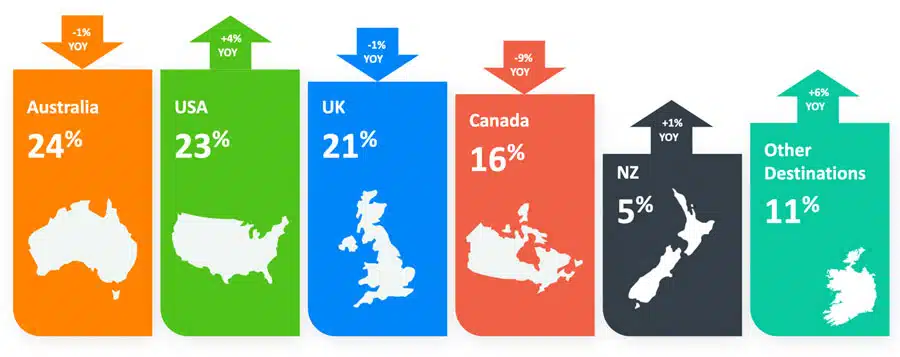International student mobility has bounced back in the wake of the pandemic, with last year seeing a record high of 6.9 million internationally mobile tertiary students around the world. But patterns are shifting globally, and for universities that means being prepared for changes in recruiting the next wave of international students. So what trends should you be ready for, and why is scalable English support critical to preparing for the next intake?
The changing shape of global international student recruitment
There are three major trends behind the current shift in international student recruitment, and the first is the significant growth we’re seeing in South and South East Asian, African and Latin American markets. Transnational education (TNE) – whether offshore or online – is particularly strong from Asia, a region that also accounted for 51.5% of all UK TNE enrolments – around 313,000 students – in 2023-24. Such enrolments are on the rise from Africa, too, with a 5.3% growth observed since 2018-19. Student numbers from South-East Asian countries such as Hong Kong and Malaysia were also up in 2024.
The second trend we’re seeing is increasing competition for students among destination countries such as the UK, Canada, Australia and USA, as well as European countries. There’s been a decline in enrolments in some of these “Big Four” countries as students look elsewhere due to costs and visa difficulties.

University World News reports a study showing that the January to March 2025 intake saw double-digit drops in international postgraduate recruitment, with Canada particularly hard hit. Interestingly, the UK bucked this trend with an 8% increase over the same period.
The third trend ties in with the costs and visa difficulties we touched on just now. Policy changes in the UK, Canada and Australia are affecting the attractiveness of certain destinations for international students, with worries over visa rules, proof of funds and restrictions all impacting prospective students’ perceptions of these countries and eagerness to enrol. In addition to countries appearing to them less welcoming or more bureaucratic, students are also having to factor in affordability – both of tuition and the cost of living – alongside post-study work rights and immigration pathways.
This combination of factors means that international students are leaning towards some destinations and away from others. Interestingly, they’re also applying earlier but delaying their final decisions – and with that, they’re expecting flexibility and digital access as a given.
Preparing for the next wave of prospective students
With applications on the rise from students in new markets, and China and India no longer the sole source of internationally mobile candidates, universities need to be prepared for prospective students with varying English proficiency from countries as diverse as Vietnam, Indonesia, Nigeria, Pakistan and Brazil. New markets mean new needs to cater for, with novel linguistic, cultural and educational contexts that require adaptable, scalable pre-sessional English support.
These changes in international student demographics bring new challenges for admissions teams, who now need to find ways to address diverse English readiness levels at scale, without overburdening their internal teams. Flexible delivery is key, whether it’s online, blended or in students’ own countries – and as demand surges and timelines shorten, scalability is no longer optional.
But how do you deliver quality English language preparation to any number of students, anywhere in the world, without compromising academic rigour or learner experience?
The solution: scalable, digital Pre-Sessional English courses
Traditional pre-sessional English courses are resource-heavy and limited by campus capacity, with many language centres facing increasing challenges with maintaining consistent standards amidst issues with staffing and seasonal enrolments. Luckily, there’s now a better way of meeting the linguistic needs of a diverse intake of students.
Online and hybrid delivery models offer the perfect solution, particularly given that they can be aligned directly with your requirements (and doing so can even shorten your admissions pipeline). These allow institutions to scale rapidly and reach students in their home countries, alleviating demands on facilities on campus. What’s more, their standardised delivery means you can be confident that assessment and outcomes are consistent and accurate.
The benefits go further than admissions, too. Pre-sessional English courses boost students’ confidence so that they arrive feeling engaged and academically ready, setting them up for success. This translates to improved student satisfaction scores and outcomes, reducing attrition. And as well as supporting your goals – whether that’s retention, compliance or student experience – a solid command of English has the added advantage of streamlining communications between you and your students.
Is your institution ready?
With a more diverse and ambitious wave of digital-first international students inbound, now is the time for universities to put in place English preparation that’s scalable and flexible enough to meet these new demands and to attract and retain the next intake. Discover how OIDI’s Pre-Sessional English can help your institution scale language support without compromising quality.









